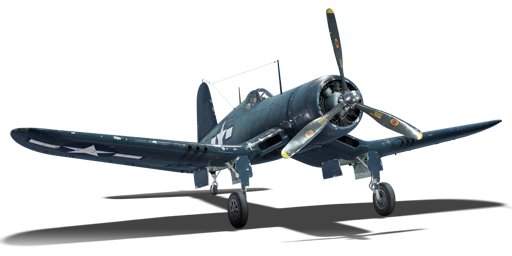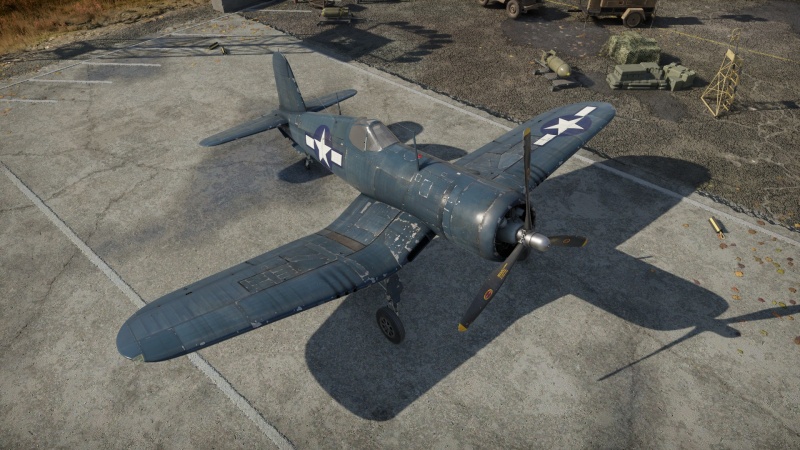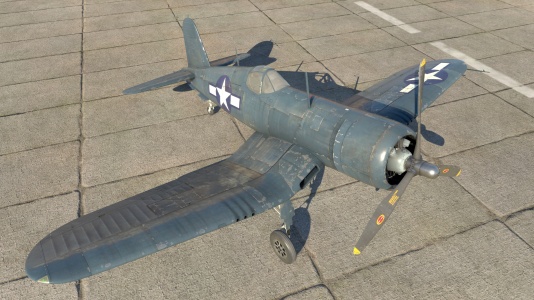Difference between revisions of "F4U-1A (USMC)"
(Edits) |
(The engine is no different from that of the F4U-1a.) (Tag: Visual edit) |
||
| Line 130: | Line 130: | ||
Due to its great energy retention and high dive speed, the Corsair is very good at Boom and Zooming. It is recommended to be used this way, especially against any Japanese planes. Against any German planes BnZ is still recommended, but some planes you can out turn ([[Fw 190 A-4]]). As with every American fighter, always climb at the start of a match. The only way to be successful with this plane is to climb high and end up higher than the enemy. Using this tactic will greatly increase your chances of getting the enemy and forcing the enemy down low where you can finish them off. | Due to its great energy retention and high dive speed, the Corsair is very good at Boom and Zooming. It is recommended to be used this way, especially against any Japanese planes. Against any German planes BnZ is still recommended, but some planes you can out turn ([[Fw 190 A-4]]). As with every American fighter, always climb at the start of a match. The only way to be successful with this plane is to climb high and end up higher than the enemy. Using this tactic will greatly increase your chances of getting the enemy and forcing the enemy down low where you can finish them off. | ||
| − | + | In addition to this, removal of the carrier landing equipment lightened the {{PAGENAME}} few hundred kilograms compared to the original F4U-1A, resulting in a slight advantage in manoeuvrability. This positively affects both the vertical and the horizontal manoeuvres along with providing slightly faster acceleration and a minor edge with its maximum speed. | |
=== Manual Engine Control === | === Manual Engine Control === | ||
| Line 182: | Line 182: | ||
;Skins | ;Skins | ||
| + | |||
* [https://live.warthunder.com/feed/camouflages/?vehicle=f4u-1a_usmc Skins and camouflages for the {{PAGENAME}} from live.warthunder.com.] | * [https://live.warthunder.com/feed/camouflages/?vehicle=f4u-1a_usmc Skins and camouflages for the {{PAGENAME}} from live.warthunder.com.] | ||
;Images | ;Images | ||
| − | <gallery mode="packed-hover" | + | <gallery mode="packed-hover" heights="200"> |
File:F4U-1A (USMC) Rework Model.jpg|<small>Reworked model of the {{PAGENAME}}</small> | File:F4U-1A (USMC) Rework Model.jpg|<small>Reworked model of the {{PAGENAME}}</small> | ||
</gallery> | </gallery> | ||
| Line 194: | Line 195: | ||
== See also == | == See also == | ||
''Links to the articles on the War Thunder Wiki that you think will be useful for the reader, for example:'' | ''Links to the articles on the War Thunder Wiki that you think will be useful for the reader, for example:'' | ||
| + | |||
* ''reference to the series of the aircraft;'' | * ''reference to the series of the aircraft;'' | ||
* ''links to approximate analogues of other nations and research trees.'' | * ''links to approximate analogues of other nations and research trees.'' | ||
Revision as of 02:54, 28 October 2022
| This page is about the American naval fighter F4U-1A (USMC). For other versions, see F4U (Family). |
Contents
Description
The F4U-1A (USMC) Corsair is a rank American naval fighter with a battle rating of (AB), (RB), and (SB). It was introduced in Update 1.39.
General info
Flight performance
| Characteristics | Max Speed (km/h at 5,486 m) |
Max altitude (metres) |
Turn time (seconds) |
Rate of climb (metres/second) |
Take-off run (metres) | |||
|---|---|---|---|---|---|---|---|---|
| AB | RB | AB | RB | AB | RB | |||
| Stock | 627 | 602 | 22.1 | 22.8 | 8.8 | 8.8 | 250 | |
| Upgraded | 687 | 653 | 20.0 | 21.0 | 16.8 | 12.3 | ||
Details
| Features | ||||
|---|---|---|---|---|
| Combat flaps | Take-off flaps | Landing flaps | Air brakes | Arrestor gear |
| ✓ | ✓ | ✓ | X | X |
| Limits | ||||||
|---|---|---|---|---|---|---|
| Wings (km/h) | Gear (km/h) | Flaps (km/h) | Max Static G | |||
| Combat | Take-off | Landing | + | - | ||
| 388 | 330 | 252 | ~11 | ~4 | ||
| Optimal velocities (km/h) | |||
|---|---|---|---|
| Ailerons | Rudder | Elevators | Radiator |
| < 450 | < 450 | < 500 | > 450 |
| Compressor (RB/SB) | ||
|---|---|---|
| Setting 1 | ||
| Optimal altitude | 100% Engine power | WEP Engine power |
| 300 m | 2,000 hp | 2,270 hp |
| Setting 2 | ||
| Optimal altitude | 100% Engine power | WEP Engine power |
| 4,785 m | 1,800 hp | 2,096 hp |
| Setting 3 | ||
| Optimal altitude | 100% Engine power | WEP Engine power |
| 6,400 m | 1,650 hp | 1,921 hp |
Survivability and armour
- 3 mm steel - above front fuel tank
- 8 mm steel - behind pilot's body
- 12.7 mm steel - behind pilot's head
- 38 mm bulletproof glass - armoured windscreen
Modifications and economy
Armaments
Offensive armament
The F4U-1A (USMC) is armed with:
- 6 x 12.7 mm M2 Browning machine guns, wing-mounted (375 rpg outer + 400 rpg centre + inner = 2,350 total)
Usage in battles
Due to its great energy retention and high dive speed, the Corsair is very good at Boom and Zooming. It is recommended to be used this way, especially against any Japanese planes. Against any German planes BnZ is still recommended, but some planes you can out turn (Fw 190 A-4). As with every American fighter, always climb at the start of a match. The only way to be successful with this plane is to climb high and end up higher than the enemy. Using this tactic will greatly increase your chances of getting the enemy and forcing the enemy down low where you can finish them off.
In addition to this, removal of the carrier landing equipment lightened the F4U-1A (USMC) few hundred kilograms compared to the original F4U-1A, resulting in a slight advantage in manoeuvrability. This positively affects both the vertical and the horizontal manoeuvres along with providing slightly faster acceleration and a minor edge with its maximum speed.
Manual Engine Control
| MEC elements | ||||||
|---|---|---|---|---|---|---|
| Mixer | Pitch | Radiator | Supercharger | Turbocharger | ||
| Oil | Water | Type | ||||
| Not controllable | Controllable Auto control available |
Controllable Not auto controlled |
Controllable Not auto controlled |
Separate | Controllable 3 gears |
Not controllable |
Pros and cons
Pros:
- Great diving characteristics
- Good energy retention
- Great speed
- Better performance than its original counterpart
- Good climb rate
- Great high-speed manoeuvrability
- Great armament
Cons:
- Can't land on carriers, lack of arrestor hook
- Mediocre flat turning characteristics
- Vulnerable to incendiary ammo
- Big target, easy to hit
- Weak damage model
History
The single-engine Chance Vought F4U Corsair was designed in 1938 for a U.S. Navy single-seater carrier-based fighter competition. This aircraft was designed from the outset as a carrier borne fighter. It featured an inverted gull wing to keep the huge propeller off the ground while keeping the landing gear short for carrier operations. Even after the completion and launch of the F4U-1, a number of problems were discovered which initially prevented the aircraft from being used as a carrier-based fighter such as bad stall characteristics due to the gull wing, no visibility over the nose for carrier landings and bouncing off the deck after landing. The Navy was forced to use the first F4U-1s for Marine Corps ground-based operations until January 1945 when most of these problems were overcome.
In the middle of 1943, the F4U-1A variant made its debut. To improve visibility, which was especially important when landing on an aircraft carrier, the cockpit canopy was modified to a convex shape, and the pilot's seat was raised 17.8 cm. Dive speed problems were solved with a stall strip just outboard of the gun ports on the starboard wing's leading edge.
The F4U-1A was produced not only at the Chance Vought factory, where the aircraft was designed but also at the Brewster and Goodyear factories (with the designations F3A-1A and FG-1A, respectively). The latter model differed in that its wings could not fold. The Chance Vought factory produced a total of 2,126 F4U-1As.
Media
- Skins
- Images
- Videos
See also
Links to the articles on the War Thunder Wiki that you think will be useful for the reader, for example:
- reference to the series of the aircraft;
- links to approximate analogues of other nations and research trees.
External links
| Chance Vought Aircraft | |
|---|---|
| Fighters | |
| Corsair | F4U-1A · F4U-1A (USMC) · F4U-1C · F4U-1D · F4U-4 · F4U-4B · F4U-4B VMF-214 |
| Float planes | O3U-1 · OS2U-1 · OS2U-3 |
| Attackers | AU-1 |
| Bombers | SB2U-2 · SB2U-3 |
| Jet aircraft | |
| Corsair II | A-7D · A-7E · A-7K |
| Crusader | F8U-2 · F-8E |
| Export | V-156-B1 · V-156-F · ▄Corsair F Mk II · F4U-7 · ▄F-8E(FN) |
| Captured | ▅F4U-1A |
| USA fighters | |
|---|---|
| P-26 Peashooter | P-26A-33 · P-26A-34 · P-26A-34 M2 · P-26B-35 |
| P-36 Hawk | P-36A · Rasmussen's P-36A · P-36C · ○P-36C · P-36G |
| P-39 Airacobra | P-400 · P-39N-0 · P-39Q-5 |
| P-40 | P-40C · P-40E-1 · P-40E-1 TD · P-40F-10 |
| P-43 Lancer | P-43A-1 |
| P-47 Thunderbolt | P-47D-22-RE · P-47D-25 · P-47D-28 · P-47M-1-RE · ⋠P-47M-1-RE · P-47N-15 |
| P-51 Mustang | P-51 · P-51A (Thunder League) · P-51C-10 · P-51D-5 · P-51D-10 · P-51D-20-NA · P-51D-30 · P-51H-5-NA |
| P-63 Kingcobra | P-63A-5 · P-63A-10 · P-63C-5 · ␠Kingcobra |
| Prototypes | XP-55 |
| F2A Buffalo | F2A-1 · Thach's F2A-1 · F2A-3 |
| BF2C | BF2C-1 |
| F3F | F3F-2 · Galer's F3F-2 |
| F4F Wildcat | F4F-3 · F4F-4 |
| F4U Corsair | F4U-1A · F4U-1A (USMC) · F4U-1D · F4U-1C · F4U-4 · F4U-4B · F4U-4B VMF-214 · F2G-1 |
| F6F Hellcat | F6F-5 · F6F-5N |
| F8F Bearcat | F8F-1 · F8F-1B |
| Other countries | ▃Ki-43-II · ▃Ki-61-Ib · ▃A6M2 · ▃Bf 109 F-4 · ▃Fw 190 A-8 · ▃Spitfire LF Mk IXc |






